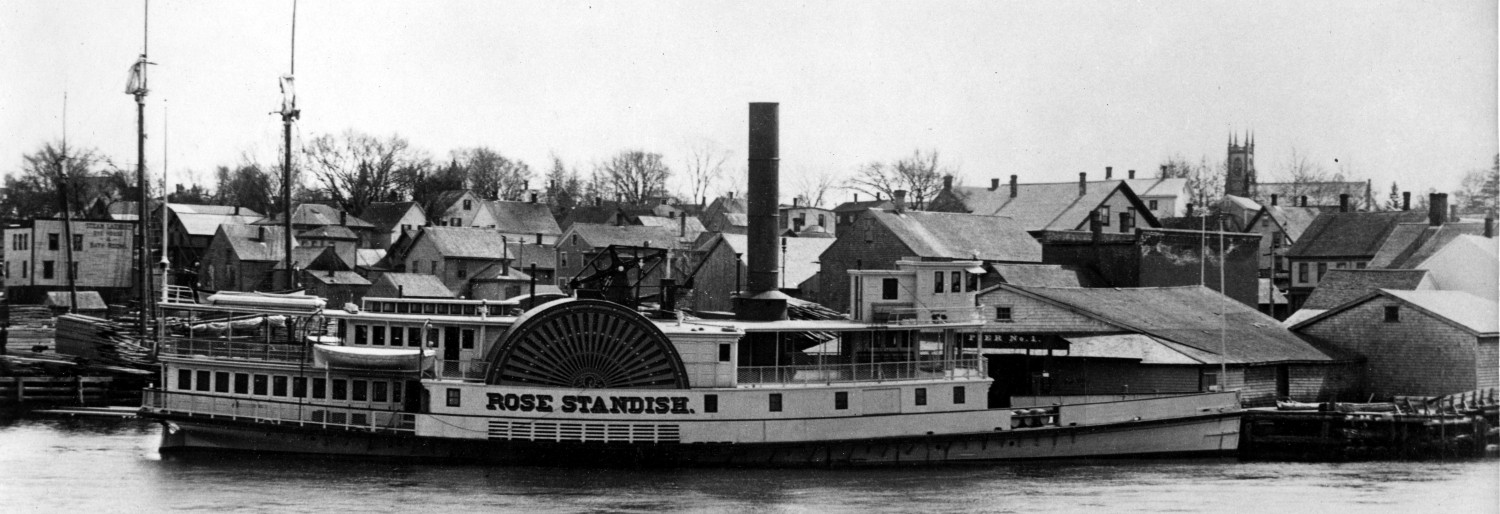The Calais Advertiser on June 9, 1948, published an article titled “49 ERS” in which Calais historian H.E. “Ned” Lamb recounts the journey of the Barque Ada around the Horn to San Francisco in the early days of the gold rush. Dozens of Downeast vessels and hundreds of natives of the St. Croix Valley were to follow the path of the Ada around treacherous Cape Horn to the gold fields. Lamb’s account is taken from the journal of one of the first 49er adventurers, Freeman Alward and contains the best description we have found of the perils and hardship of the journey. Much of the article consists of direct quotes from Alward’s journal which are in italics below. Lamb occasionally summarizes sections of the journal. Those summaries are labelled “Lamb notes”. We have added the graphics and photos. Freeman’s last name is variously spelled as Alwood and Alward. Further the dates after rounding the Horn do not include the month so are somewhat difficult to follow. The entire journey took 7 months.
’49 ERS
By H.E. Lamb
The remarkable journal from which this story is taken was written by one of the passengers, Freeman Alward. He was a relative of Mrs. Arthur Hiltz, whose kindness allowed us to use it. This copy is on 26 sheets of those double 12-inch-long paper making 52 pages and written on both sides. The voyage may be divided into two parts. Down to the Falkland Islands, where a terrible adventure met them. Then around the horn, to Juan Fernandez Island, and then to San Francisco.
Our note-Ads like the one below began to appear in the Calais Advertiser and St. Stephen Courier soon after the discovery of gold in California reached Downeast. It does appear the Brig Brazilian and Barque Ada were two of the first to make the journey although some Calais men had left for the golf fields in June of 1849.
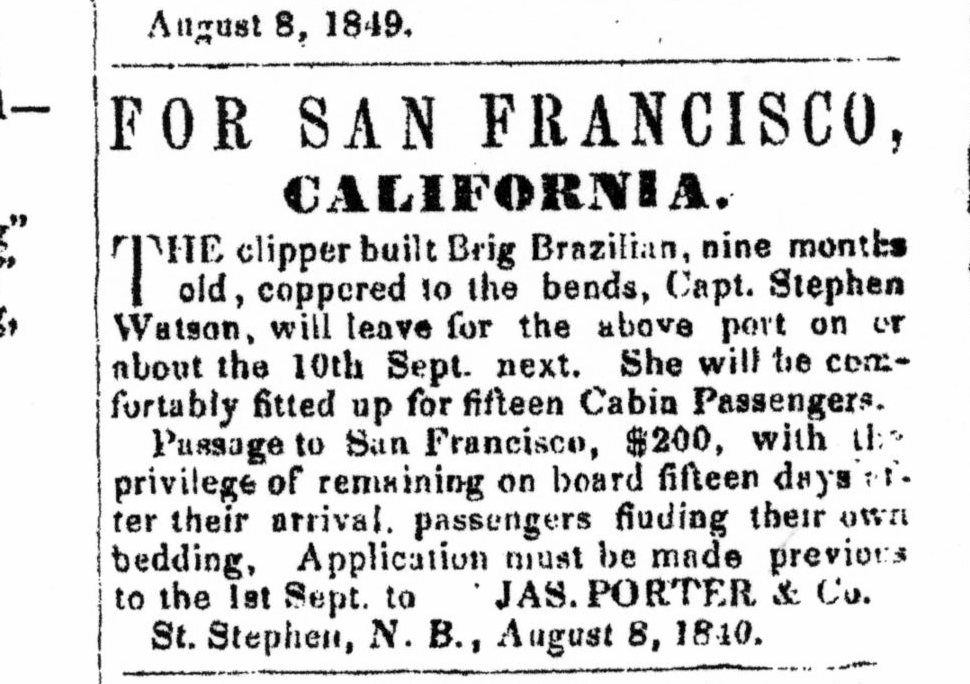
The Brazilian was also to sail for San Francisco from St Stephen but left after the ADA
Calais, Me September 1, 1849- An advertisement in local papers promised the sailing of the Ada to the gold fields within 10 days. The promoters were as good as their word.
Big news. Gold discovered in California. Bark Ada will leave St. Stephen within 10 days for San Francisco by way of Cape Horn. About 25 passengers can be taken. For rates and time of sailing see captain John Watson.
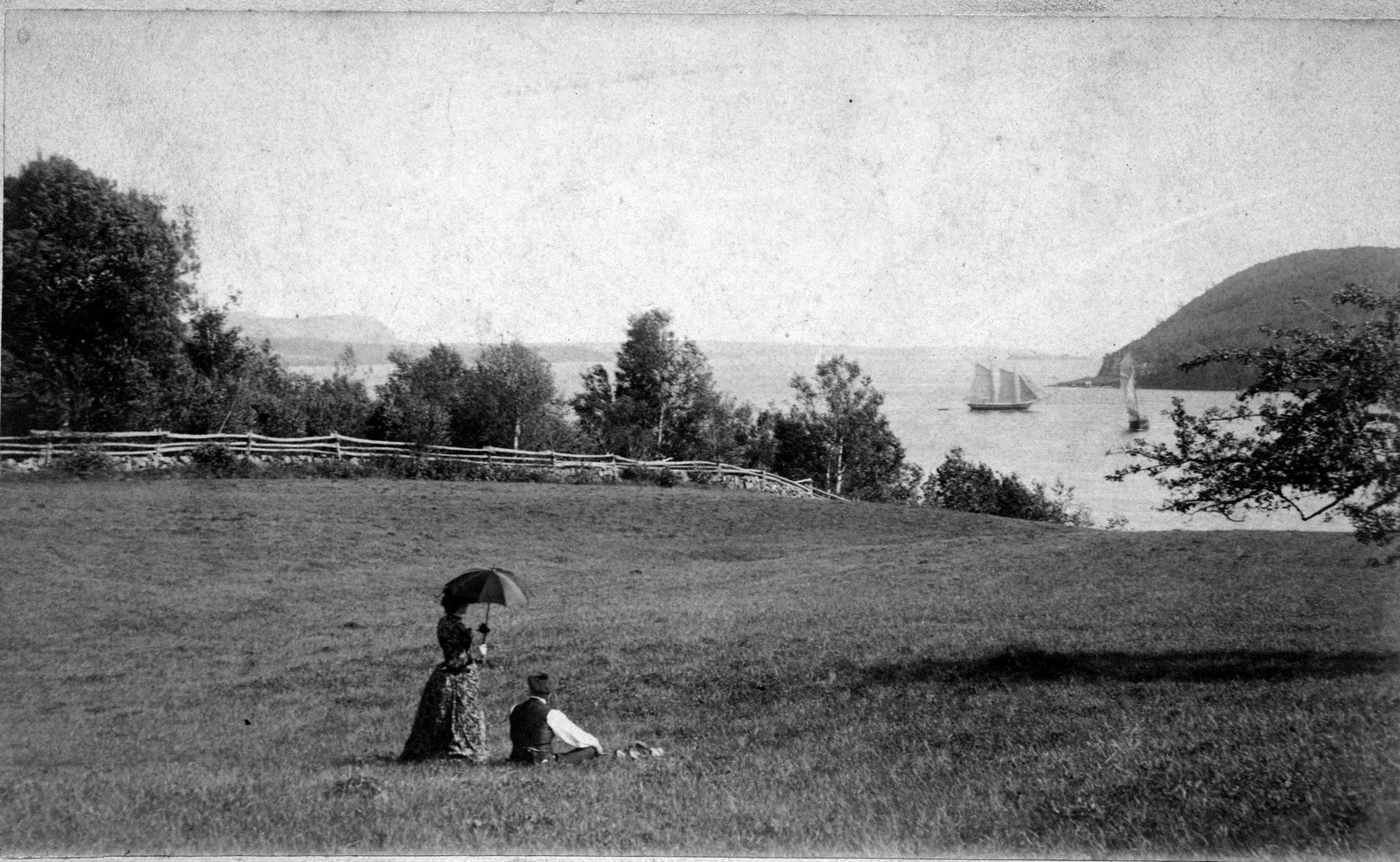
The Ledge below St. Stephen from which the Ada sailed. Devil’s Head to right.
Lamb Note: This is not a fiction story, but an actual record of the Barque Ada from Saint Stephen (The Ledge) around “Horn” to California. The names of the crew were as follows: Captain John Watson, S. E. ________ first mate; Simeon Maloney, William Hatcher, first steward, William Mercer, second steward, Augustus Blam, Carpenter, Thomas________, Cook. Sailors, Andrew Hutchinson, John Atchison, Francis Patton, Ira Brown, William Carn, William McDonald, John Cushing.
The list of passengers reads as follows, Francis Burke MD, Stephen Hill, James Graham, Thomas Wade, Samuel Millbury, Miss Ann Millbury, GB Hayward, Andrew Todd, George Bixby, Harrison Whitney, Columbus Tyler, Amos Wilder, Freeman Alward, George Quincy, A.D. Brockway, GW Foster, John A. McPhail, Aaron Peabody, Joshua Ryder, Edward Barry, John Greenlaw, Thomas Burrows, William Hunter, Charles Heywood, Samuel Heywood, Franklin Heywood.
“Two pigs, hens, cats and dogs were all the livestock we had on board.”
THE SAILING
Calais-September 10, 1849:
Left home Monday morning with a heavy heart, on arriving at the ledge Charlotte County New Brunswick went aboard the ship ADA which was lying there, it was about 2:00 PM. Found a number of passengers on board, shortly after we were favored with the company of ladies and gentlemen from Saint Stephen and Milltown as follows: – Miss C Watson, Miss Mary Hill, Miss Mary Todd, Miss Bixby, Miss Quimby, Miss McAllister, Doctor Mitchell and brother, George and Steven Allwood and a great many more. In fact, the ship was crowded with folks from all parts of the country, we could see about 20 horses and carriages tied to the fences, it looked like some public meeting. We had a fine social time, but soon we had to part with them, they left wishing us a good passage and luck. I could not stay the tears when parting with my brothers, my eyes followed them out of sight, and then I began to think about leaving home, mother, sisters and brothers for which cause I was now sorrowful, no one can tell my feelings but those who experience it. After parting with friends who partook supper, and retired to our cabins, we sang home sweet home two or three times, it never sounded so sweet to my ears before, we also sang a piece of sheet music which we thought very appropriate, it seemed to suit the occasion. It could not help leaving us an impression on parting with our friends for such a long sea voyage.
A breeze from the northward is blowing
O swiftly the good ship will fly
I’m ready but linger in parting
And slowly I bid you goodbye
And slowly I bid you goodbye
Tuesday September 11th-1849
We arose very early this morning, to pack away and arrange our things. Our cabin was in the middle house on deck, we chose it for the reason that that it was in the middle of the ship, there was no table in it, and we had more room, and in heavy weather the motion was much easier, than if it was aft or forward. The morning was fine with a light breeze, About 10:00 Henry Eaton came on board to bid us goodbye, all were glad to see him, our pilot Maloney came on board about the same time, at 12:00 we were ready for sailing, the wind was very light, we hoisted anchor, sailed down as far as Robinson and Saint Andrews, some of the passengers with the captain landed at Saint Andrews, made some small purchases, and some went to Robbinston, and at night one of them was missing, most of the passengers had trouble getting away. The sheriff was on the water making inquiries about certain men we had on board, and officers were sent to Eastport and Robbinston, this being known to the ones on shore, one had just time to make his escape to the woods, where he had to stay till dark, then give a man 2 1/2 dollars to take him on board again, he did not leave the ship again.
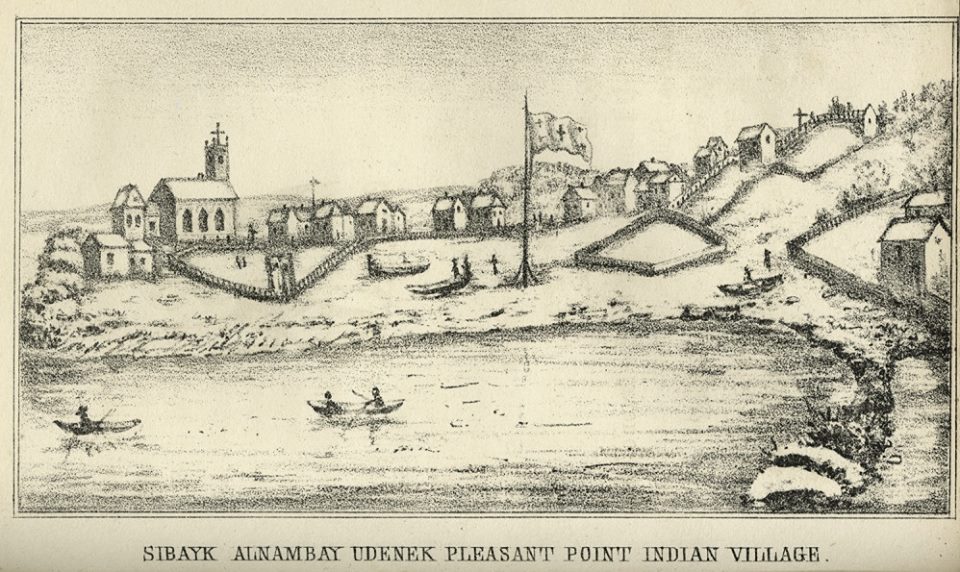
Sketch of Pleasant Point 1857
Wednesday September 12, 1849
Hoisted anchor in the morning, sailed down as far as Pleasant Point, winds light had to cast anchor again, and Doctor Burke went to Eastport. Maloney and second mate and half of our passengers, and Our Lady missus Millbury went on shore at Pleasant Point to see the Indians who had two weddings there, they had a great time, and a good dinner. Stephen Hill dined with them, the Indians turned out with drums and fifes, had a regular spree, and topped off with a drunk.
Thursday September 13, 1849
Caught a fine lot of fish this morning and had a fine time, hoisted anchor about 12:00 and sailed as far as Eastport, the captain went from Eastport up to Calais by steamboat, last night just as we were sailing down and got nearly to Eastport, the steamboat overtook us, the captain, two pigs and a dozen hams he brought on board, a number of passengers went on and spent the evening there. I did not leave the ship.
Friday September 15, 1849
Hoisted anchor and sailed as far as Deer Island, the wind was light, had to anchor again, we went fishing again, caught a lot of fish, went on shore. Mr. Wade went to see his folks, heard there was to be a great quilting, some of the neighbors sent invitations to the captain who went also. Maloney, the fiddler, Peabody, Wilder and Quincy had a whale of a time, danced all night, got home in the morning after breakfast.
Lamb note:
They passed West Quoddy Head about 1:30, the lighthouse about 1:30 the next day- this made five days going down from the ledge to get out into some rough water. After getting to sea, they had very disagreeable weather.
Friday the 21st, “wind continues very strong, and we are all sick as clams, very disagreeable weather. Saturday 28th, fire in sailors house on deck this fire was put out easily but gave them a great scare. Sunday the 23rd heavy thunder shower. Her monkey rail was underwater. We have plenty of provisions aboard, but the cooking is miserably poor. Sunday the 24th– reading a prayer by Maloney, the day spent as usual no work done on board except ship duty. Tuesday 30th– thermometer stands at 112 degrees, our dogs and cats are crazy with heat. November Saturday the 3rd– 100 in shade, caught a large shark measuring 10 feet. We are all allowed three quarts of water a day for two months and that is not fit for a hog to drink, it was put up in oil casks as soon as it came into hot weather, it is mostly impossible to drink it.
Lamb note: Mr. Alward was sick a good part of the way down, and besides he was most frightfully homesick and often longs for his dear mother and wishes he could send a letter to her. He tells about having shark and flying fish to eat and once they made an albatross pie and that made everybody sick.
A song was composed on board the Bark Ada for the passengers by Doctor Francis Burke from Milltown – Calais
Tune to the floating scow of old Virginia.
Careening over the Ocean’s foam
Our hands our dull and cold
We’ve doomed ourselves to seven months roam.
In quest of paltry gold
The men look blue the air is cold.
Our friends we’ve left on shore.
Then carry me back to old Milltown.
To old Milltown once more
There are 12 verses of this song and all end with the same two lines. A regular Milltowner wasn’t he?
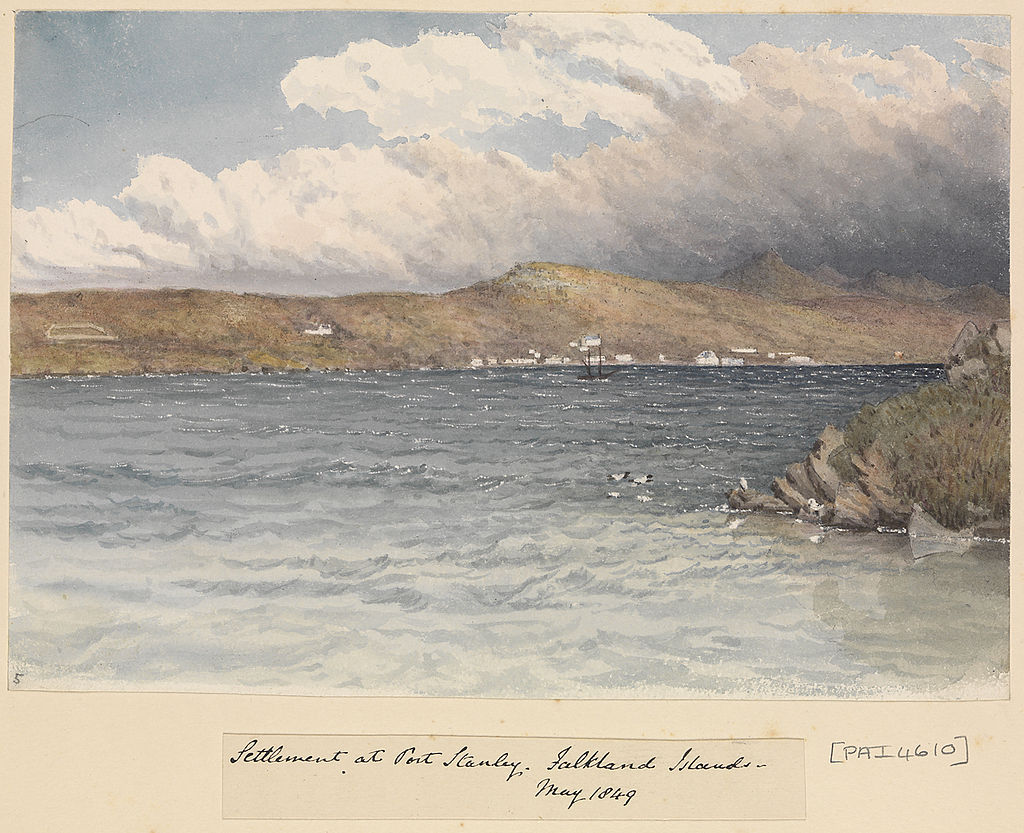
For Some reason the Ada was unable to locate Port Stanley, the only settlement and good harbor in the Falklands in 1849
Lamb note- Though the voyage was rough they had the Falkland Islands in sight. There was a lot of speculating about what they would do when they landed. Some wanted to go to church on Sunday. They expected to find a curious race. They had hard work making a Bay, but at last they anchored. The island was a barren one, not a tree or a shrub in sight. Some of the passengers were so eager to get ashore that they took boats and canoes at once and when they got back to the barque they were very nearly starved as they took no food with them. But they found quantities of ducks and geese and penguins so fearless that they would not move out of the way. They killed many ducks and took them aboard all dressed.
December 25th Tuesday
Christmas Day
After breakfast this morning we prepared ourselves to have Christmas dinner on shore at the Falkland Islands 8000 miles from home and we do not know how far from any inhabitants- have not seen the sign of any being as yet. We had our dinner, a goose stew made with pork hard bread and flour for thickening, tea molasses constituted the meat and thought it was fine.
Lamb note: Tragedy
While the author and his party were enjoying their Christmas dinner another boatload from the ADA landed. They had seen a wolf on the hillside and one of the passengers had started chasing it with a double barrel shotgun. When this boat went back to the ADA late in the afternoon A.D. Brockway was missing.
The night was not very dark so a boatload of men went ashore and followed up the hill where Brockway had been last seen. At the top of the hill, they came across a cave and his body lying in it. They heard some wild animals inside and thought that they had killed him. They did not dare to go in so came back the next morning. The captain had a shotgun. When they got to the cave the captain fired the gun but the barrel exploded, but fortunately without doing very much damage although some of the pieces hit some of the men.
They got the body of Brockway out and then saw what had happened. Brockway had followed the wolf to the cave and shot it. Then he had tried to get the wolf out with the butt of the gun while holding on to the other end. The other barrel had gone off, killing him. They took the body to the ADA and prepared it for burial. I helped to dig his grave. Doctor Burke composed some verses which were quite appropriate.
To tune of Mount Vernon
Father Lord, we hear address thee
Pained with grief o’erspread with care
For a brother we are grieving
Deepest gloom are faces wear.
We procured a flat stone and worked it down for a gravestone had the following epitaph carved on the stone in good large and handsome letters.
A.D Brockway
Of Calais Maine
We also wrote a letter and put it in a bottle and placed it on top of the grave telling the story and asking it the grave be respected. The letter was signed by captain John Watson on December 27th. Brockway was born Magaguadavic, Charlotte County, New Brunswick but late of Calais, Maine.
There on that barren island they had to leave that lonely grave and after getting a supply of fresh water they sailed for the horn.
Monday December 31st, 1849
It was the good ship Ada with their crew of 14, and now 25 passengers, as one had been left in that lonely grave on Falkland Islands that waited three days for a wind that would take them out of the harbor. They’d taken aboard five or six barrels of clams during their stay.
January 1st, 1850: The wind came very fair but very light. We hoisted anchor about noon, had to anchor again in the night.
January 3rd:
The wind is fair and strong, we are running for the Cape at a great rate.
1850 January 6:
Midland at southeast point of Tierra del Fuego at 8:00 PM, fell in with the Brazilian
Lamb Note- the writer does not tell us enough about this vessel. He says that they were 17 days later from home than we were, and they had some news that was interesting. It was calm and they visited back and forth.
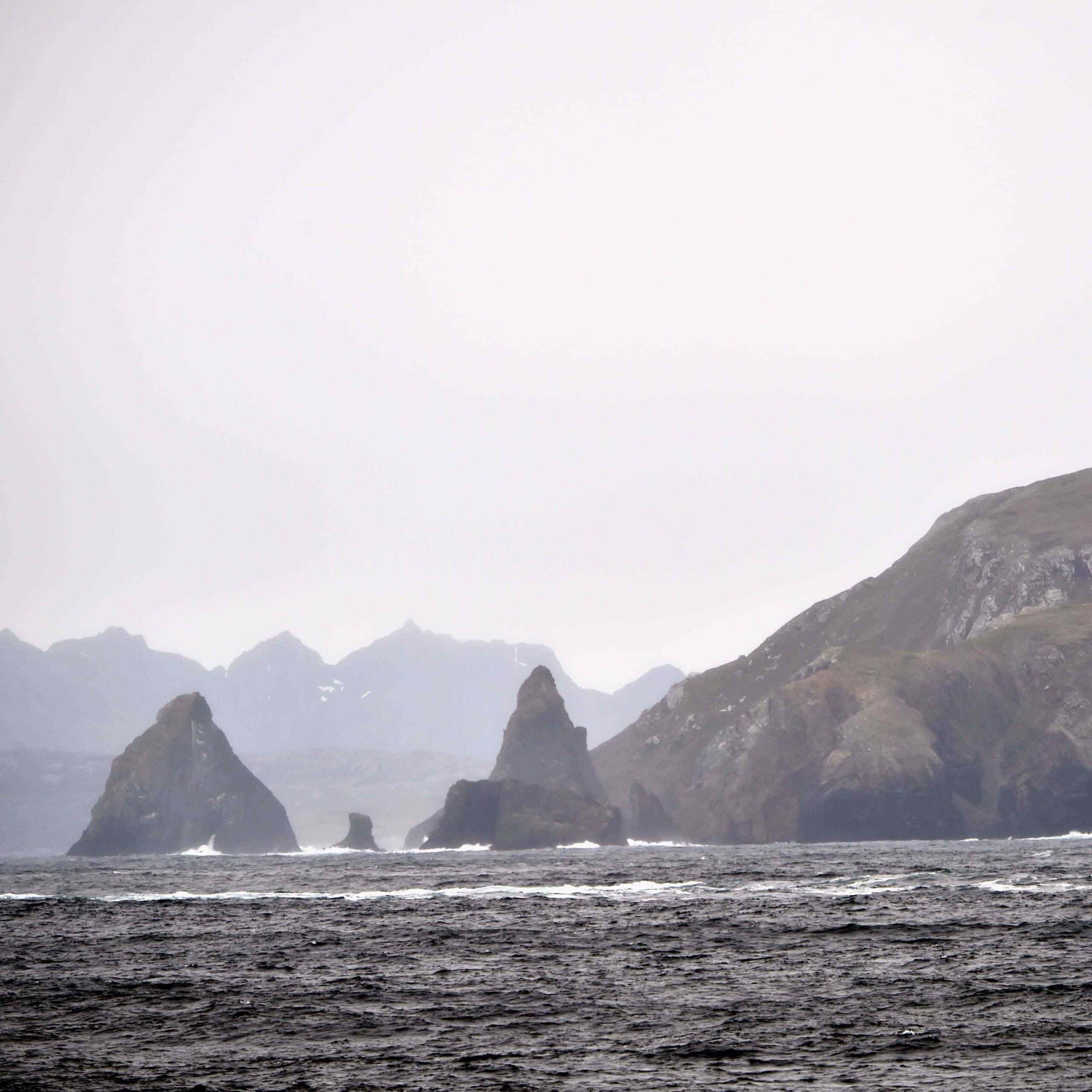
The notorious Cape Horn at the tip of South America
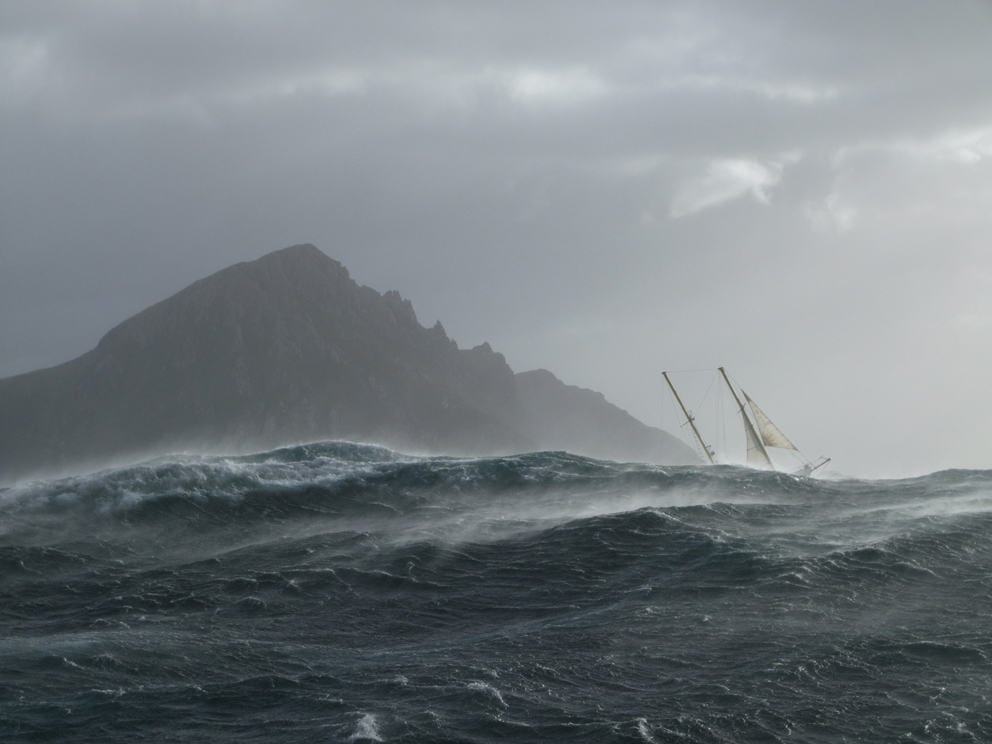
It took the Ada a month to make the passage into the Pacific. This was not unusual
Lamb Note- The Cape proved its traditional trouble spot.
Wednesday 9th– we found a strong current setting us to the eastward, we lost 30 miles in 24 hours. We should have made the cape but did not do so as we were blown back 100 miles or more. Wednesday 16th: Made Cape Horn about 6:00 PM, five miles off her we had a grand view of the Horn. The islands around it present a volcanic appearance and were covered with snow. The old Horn looked as if the snow, winds and rain had pitted his old head until it was as bare and bald as a shaft stem. Friday the 18th: We have experienced a complete gale since we saw the Cape, the wind came ahead about dark and blew a perfect tornado, these were the largest seas we saw at all. The gale lasted about 36 hours and blew us back home some 100 miles.
Lamb Note- the barque leaked badly, and they were afraid she would go down. But after the storm ended the ADA was not in as bad condition as they thought
Sunday the 20th: having good winds have passed the Cape again too far East to see it again. Have been more than a month getting around the Cape. We spoke with a small Brig from Bangor ME; her name was Samuel and Edward.
Lamb Note- Around the Cape they saw many vessels, sometimes seeing four or five at a time. Some were whalers, some going to California, one going to Valparaiso. Spoke to the schooner Harriet Lawrence of South Boston. When they got into the Pacific it proved to be true to its name and traditions and they had much better weather.
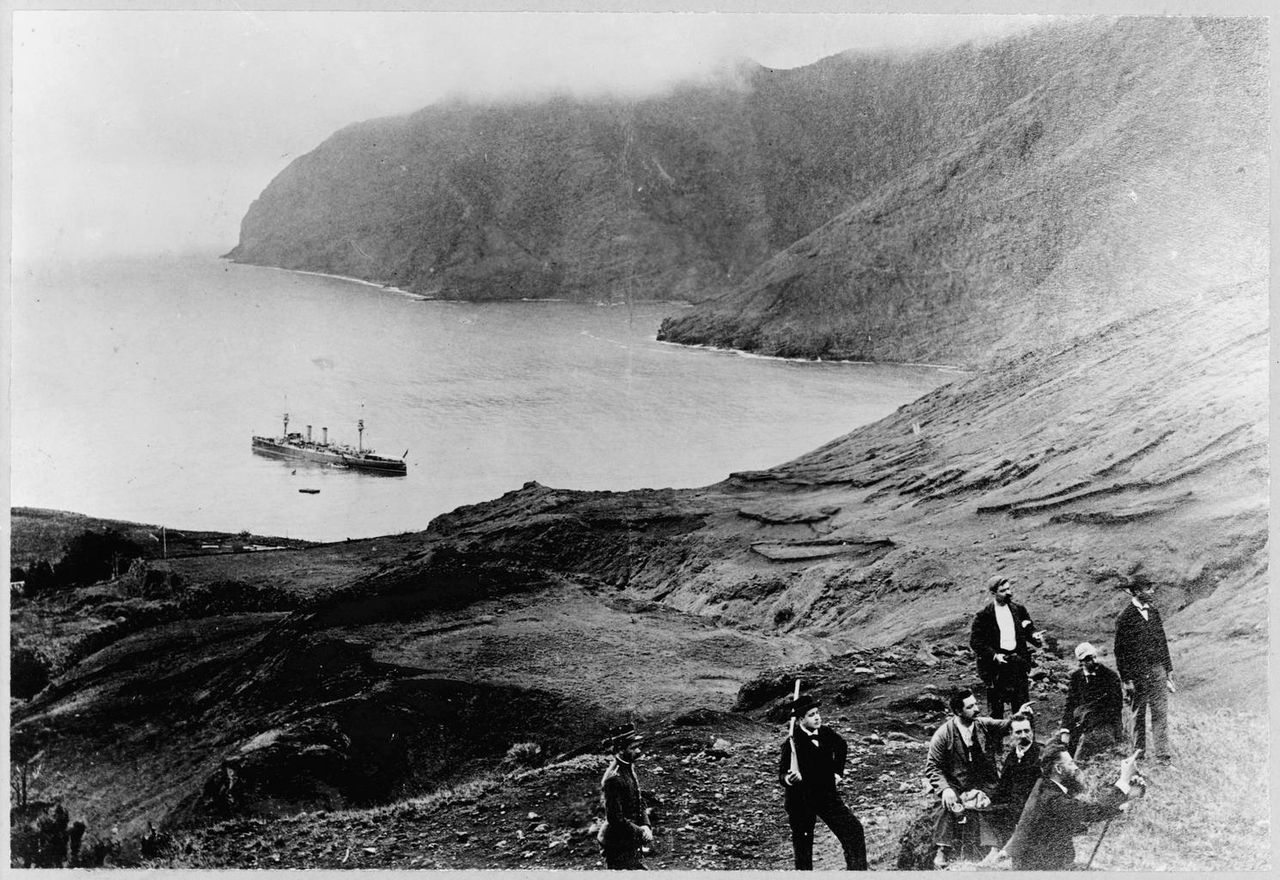
The harbor at Juan Fernandez
Wednesday the 30th made land this morning at 7:00 wind being northeast we ran up north and found it was Juan Fernandez, saw big ships trying as we supposed to make the harbor, they proved to be whalers that had sent their boats ashore after water. Thursday 31st made harbor about 8:00 this morning and was perfectly astonished with the appearance of the island, it was thrown up in mountains and peaks perpendicular 1000 and 1200 feet high, these peaks cover the whole island, and they say there is not a level place on the whole island to the extent of a mile. We expected to find a large number of inhabitants but there were only nine houses and 10 inhabitants, two families of Spaniards and one Nova Scotia man. The nasturtiums we turn to good use as we pick large quantities of and made pickles of them, we ate everything we could and devoured it like starving dogs. Bought 50 large onions of the Spaniards, gave them a cent apiece for them, we wanted to keep off the scurvy as our old doctor took the scurvy.
Lamb Note- a party from the ADA went to another island and captured 20 goats and let them loose on the deck. They got into everything. One kid got into the cook’s galley when the cook was not there. He jumped into the tub of bread dough and then into the flower barrel. Some of them visited a cave they called Robinson Caruso’s cave. They visited an abandoned large settlement where the houses were made of brick and there was the remains of a church. The author fell in love with the climate and wished that his friends, especially his mother, might live there.
The voyage from Juan Fernandez was very tedious, everyone was anxious to get it over with. Supplies were giving out. We have no sieve on board, have to use our meal and flour without shifting consequently have to eat a good many bugs and worms. I have picked out of the bread worms an inch long and black bugs out of the gruel without number almost.
Tuesday 21st: Our company was disgraced by two fights, one between Dr. Burke and Harrison Whitney and the other between second mate Maloney and the sailors. The first one was not finished as they were parted, they have adjourned it until they get on shore, they intend to make use knives and kill one another. The latter one was also parted after considerable fighting, leaving black eyes and bitten fingers and bloody noses, they all commenced about trading things not worth a man’s notice. The sixth moon we have had since we left home, the moon looks very odd to us; the position is not the same as at home. The old man with his arm full of wood is lying on his back and the moon looks to be turned over- upside down.
The captain has the appearance of the barque changed with spars, like a full rig, and having the vessel painted. The passengers began to get ready to land by making handles for their picks and hatchets and mending their clothes. Missus Millbury proved to be very helpful in this work. There is very little said of her, but she stood the voyage somewhat better than the men did.
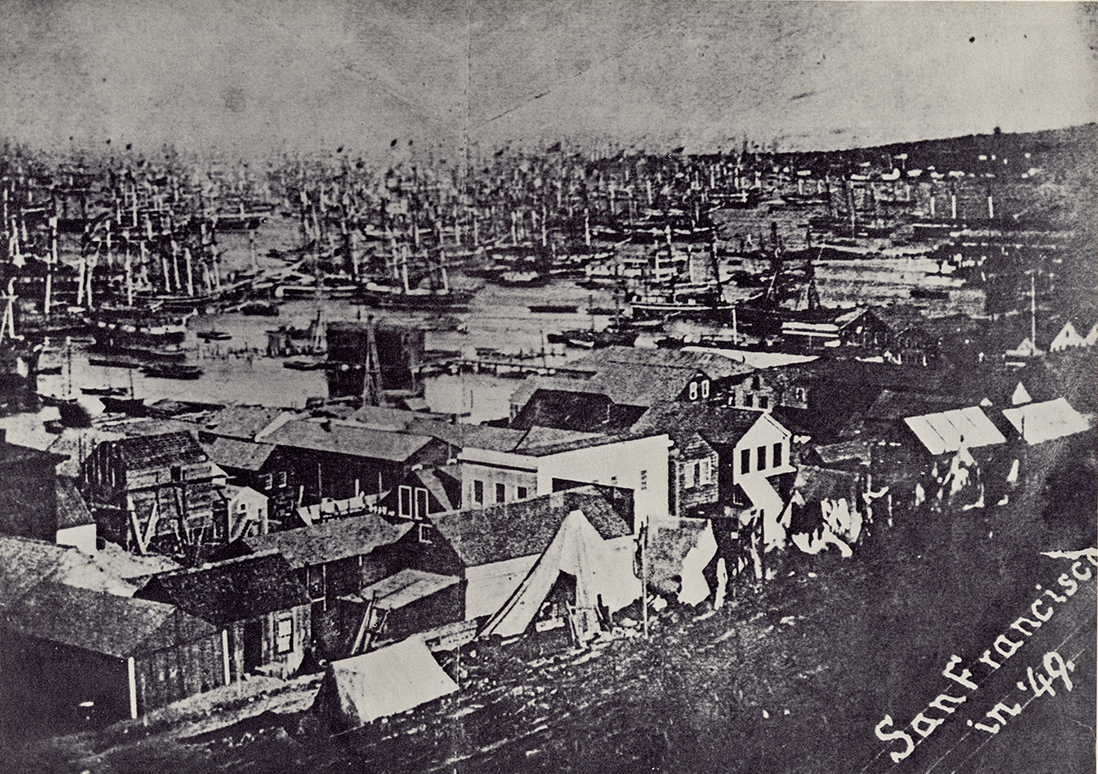
The ships in the harbor are mostly abandoned as the crews jumped ship to prospect for gold
Lamb note: The seven months voyage came to an end at last and the Ada, with all her troubles, sailed up the long harbor of San Francisco and came to anchor alongside a long row of other vessels. When they got ashore, they found business very dull and little employment. The manuscript ends very suddenly with these words “had a tent erected over the provisions and board was from the $16 to $30 per week.”
End of Article
While all but one of the voyagers arrived in San Francisco there remains the question of their fate on these distant shores. Did they strike it rich, returning to the St Croix Valley with backs bent under the weight of sacks of gold dust or perhaps broke and disillusioned? Did they remain in California either as prosperous pioneers or in a shallow grave, murdered in the lawless gold fields?
In part 2, we’ll answer for a few of them including the author of the journal. For now, we’ll only tell you that A.D. Brockway lives on in his Falklands grave as the “Spirit of Old Brock”. Brock regularly spooks any horse passing near his grave and locals will tell you stories guaranteed to raise the hair on the back of your neck.
